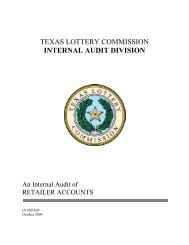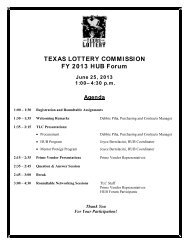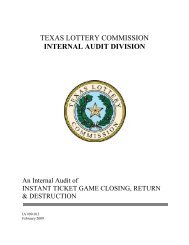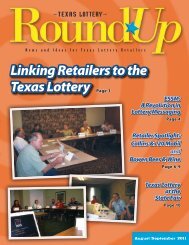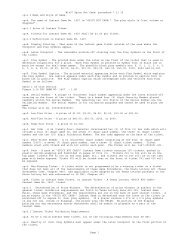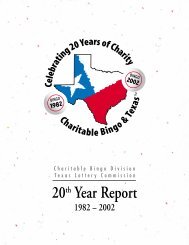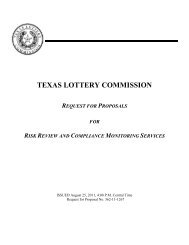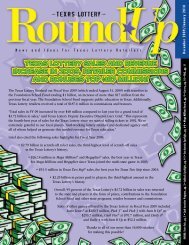Internal Audit of Charitable Bingo Regulation - Texas Lottery
Internal Audit of Charitable Bingo Regulation - Texas Lottery
Internal Audit of Charitable Bingo Regulation - Texas Lottery
Create successful ePaper yourself
Turn your PDF publications into a flip-book with our unique Google optimized e-Paper software.
TEXAS LOTTERY COMMISSION<br />
INTERNAL AUDIT DIVISION<br />
An <strong>Internal</strong> <strong>Audit</strong> <strong>of</strong><br />
CHARITABLE BINGO REGULATION - AUDIT<br />
SERVICES<br />
IA #06-022<br />
August 2006
<strong>Texas</strong> <strong>Lottery</strong> Commission<br />
<strong>Internal</strong> <strong>Audit</strong> Division<br />
<strong>Charitable</strong> <strong>Bingo</strong> <strong>Regulation</strong> – <strong>Audit</strong> Services<br />
TABLE OF CONTENTS<br />
EXECUTIVE SUMMARY .........................................................................................................................................1<br />
MANAGEMENT’S OVERALL RESPONSE...........................................................................................................2<br />
DETAILED REVIEW RESULTS..............................................................................................................................3<br />
1. Regulatory Objective and Approach –The <strong>Charitable</strong> <strong>Bingo</strong> Operations Division should develop a defined and<br />
articulated regulatory objective to effectively address its statutory charge.........................................................3<br />
2. Licensee Experience – Current processes require significant improvements to better ensure licensees a fair,<br />
consistent, and open regulatory experience. ........................................................................................................5<br />
Transparency <strong>of</strong> Criteria.................................................................................................................................5<br />
Fairness <strong>of</strong> Process.........................................................................................................................................6<br />
Clarity <strong>of</strong> Scope...............................................................................................................................................8<br />
3. <strong>Audit</strong> Methodology and Protocol – The audit methodology and protocol used by the <strong>Audit</strong> Services<br />
Department does not ensure adequate audit coverage and quality. ..................................................................11<br />
<strong>Audit</strong> Methodology........................................................................................................................................11<br />
<strong>Audit</strong> Protocol...............................................................................................................................................12<br />
4. Organizational Structure and Responsibilities – The current organizational placement and responsibilities <strong>of</strong><br />
the <strong>Audit</strong> Services Department do not ensure the auditors adequate independence..........................................16<br />
Incompatibility <strong>of</strong> Duties...............................................................................................................................17<br />
Reporting Structure.......................................................................................................................................17<br />
5. Additional Concerns...........................................................................................................................................18<br />
Integrity and Reliability <strong>of</strong> the Automated <strong>Charitable</strong> <strong>Bingo</strong> System ...........................................................18<br />
Unimplemented Provisions in the <strong>Bingo</strong> Enabling Act.................................................................................18<br />
Clarity Needed within the <strong>Bingo</strong> Enabling Act:............................................................................................18<br />
Paradigm – Operator vs. Organization ........................................................................................................19<br />
AUDIT PURPOSE, SCOPE AND METHODOLOGY..........................................................................................20<br />
BACKGROUND........................................................................................................................................................21<br />
APPENDIX A ............................................................................................................................................................23<br />
APPENDIX B.............................................................................................................................................................25<br />
August 2006 i IA # 06-022
<strong>Texas</strong> <strong>Lottery</strong> Commission<br />
<strong>Internal</strong> <strong>Audit</strong> Division<br />
<strong>Charitable</strong> <strong>Bingo</strong> <strong>Regulation</strong> – <strong>Audit</strong> Services<br />
EXECUTIVE SUMMARY<br />
<strong>Charitable</strong> bingo provides non-pr<strong>of</strong>it organizations in <strong>Texas</strong> an opportunity to raise money for<br />
charitable activities. The <strong>Charitable</strong> <strong>Bingo</strong> Operations Division (CBOD) <strong>of</strong> the <strong>Texas</strong> <strong>Lottery</strong><br />
Commission (TLC) is responsible for regulating charitable bingo games in the state <strong>of</strong> <strong>Texas</strong>.<br />
The <strong>Charitable</strong> <strong>Bingo</strong> Operations Division faces significant challenges in administering their<br />
statutory responsibilities. The charitable bingo industry is comprised <strong>of</strong> both large high-volume<br />
bingo halls and small volunteer-based halls. <strong>Bingo</strong> game operations are largely a cash-based<br />
business and dissenting opinions exist as to the need for bingo gaming and the extent <strong>of</strong><br />
necessary regulation in <strong>Texas</strong>. In addition, several areas in the enabling statute itself lack<br />
consistency, clarity, and/or relevancy. These elements combine to create a complex and<br />
challenging regulatory environment.<br />
The purpose <strong>of</strong> our audit was to evaluate the effectiveness <strong>of</strong> the <strong>Charitable</strong> <strong>Bingo</strong> Operations<br />
Division in achieving its statutory charge <strong>of</strong> ensuring that bingo conducted in this state is fairly<br />
conducted and that proceeds derived from bingo are used for an authorized purpose.<br />
Specifically, we focused our review on the activities and responsibilities <strong>of</strong> the <strong>Audit</strong> Services<br />
Department within the <strong>Charitable</strong> <strong>Bingo</strong> Operations Division. In addition, based on risk, we<br />
further limited our scope to examining the regulation <strong>of</strong> organizations licensed to conduct<br />
charitable bingo.<br />
Overall, we found that the activities and processes <strong>of</strong> the <strong>Audit</strong> Services Department do not<br />
effectively ensure that charitable bingo is fairly conducted, nor that proceeds derived from bingo<br />
are used for an authorized purpose.<br />
Fundamental changes are needed to ensure that statutory charges are met. These include defining<br />
and articulating the regulatory objective and focus for the division, providing for a more fair,<br />
open and consistent regulatory experience for licensees, adopting an audit methodology and<br />
protocol which will ensure adequate coverage and audit quality, and ensuring adequate<br />
independence for the auditors.<br />
Detailed results and recommendations <strong>of</strong> <strong>Internal</strong> <strong>Audit</strong>’s review are presented in the “Detailed<br />
Review Results” section <strong>of</strong> this report.<br />
<strong>Internal</strong> <strong>Audit</strong> would like to express our appreciation to the <strong>Charitable</strong> <strong>Bingo</strong> Operations<br />
Division and other agency staff for their cooperation and assistance during this engagement.<br />
Their courtesy and responsiveness extended to <strong>Internal</strong> <strong>Audit</strong> allowed us to complete our work<br />
effectively and efficiently.<br />
August 2006 1 IA # 06-022
<strong>Texas</strong> <strong>Lottery</strong> Commission<br />
<strong>Internal</strong> <strong>Audit</strong> Division<br />
<strong>Charitable</strong> <strong>Bingo</strong> <strong>Regulation</strong> – <strong>Audit</strong> Services<br />
MANAGEMENT’S OVERALL<br />
RESPONSE<br />
<strong>Charitable</strong> <strong>Bingo</strong> Operations Division management has expressed full agreement as detailed in<br />
this report.<br />
<strong>Internal</strong> <strong>Audit</strong>’s Overall Comment to Management Responses:<br />
<strong>Internal</strong> <strong>Audit</strong> recognizes the long-term strategic efforts necessary to address the conditions<br />
noted in this report; in particular, the efforts needed to ensure statutory objectives are effectively<br />
and efficiently met, and to strengthen overall processes and controls related to the <strong>Audit</strong> Services<br />
Department’s role in charitable bingo regulation. We encourage and support <strong>Charitable</strong> <strong>Bingo</strong><br />
Operations Division management in its endeavors to achieve earlier implementation than those<br />
dates noted in their responses.<br />
August 2006 2 IA # 06-022
<strong>Texas</strong> <strong>Lottery</strong> Commission<br />
<strong>Internal</strong> <strong>Audit</strong> Division<br />
<strong>Charitable</strong> <strong>Bingo</strong> <strong>Regulation</strong> – <strong>Audit</strong> Services<br />
DETAILED REVIEW RESULTS<br />
The following review results and recommendations represent opportunities for the <strong>Charitable</strong><br />
<strong>Bingo</strong> Operations Division (CBOD) to strengthen its overall processes and controls related to the<br />
<strong>Audit</strong> Services Department’s role in charitable bingo regulation.<br />
Regulatory Objective and Approach –The <strong>Charitable</strong> <strong>Bingo</strong> Operations<br />
1<br />
Division should develop a defined and articulated regulatory objective to<br />
effectively address its statutory charge.<br />
The statutory charge for the <strong>Charitable</strong> <strong>Bingo</strong> Operations Division (CBOD) under the <strong>Bingo</strong><br />
Enabling Act (the Act) reads as follows:<br />
The Commission has broad authority and shall exercise strict control and close<br />
supervision over all bingo conducted in this state so that bingo is fairly conducted<br />
and the proceeds derived from bingo are used for an authorized purpose. 1<br />
During our review, we were not always able to tie activities and processes <strong>of</strong> the <strong>Audit</strong> Services<br />
Department to the statutory charge. As this report further details, CBOD auditors perform<br />
minimal assessment <strong>of</strong> licensees as to the fair conduct <strong>of</strong> the games and as to determining the<br />
proceeds derived from the games.<br />
In further examining the efforts <strong>of</strong> the <strong>Audit</strong> Services Department, it became evident that many<br />
<strong>of</strong> the actions <strong>of</strong> the department do not clearly represent a consistent regulatory objective or<br />
approach. In some matters it appeared the department enforced a strict, almost zero-tolerance<br />
approach to regulatory compliance; yet in other matters the department appeared to assist or<br />
foster licensees in coming into compliance. These disparities in approach, however, did not<br />
appear to be based on relative risk or impact to the statutory charge. Ultimately, we believe the<br />
lack <strong>of</strong> a defined and articulated regulatory objective has led to an overall lack <strong>of</strong> focus on higher<br />
areas <strong>of</strong> risk as opposed to lower areas <strong>of</strong> risk.<br />
An example <strong>of</strong> this is reflected in the <strong>Audit</strong> Services Department’s examination procedures.<br />
Violations <strong>of</strong> seemingly less impact to the statutory charge are pursued, while apparently more<br />
significant violations are not addressed. Specifically, CBOD auditors will assess whether the<br />
licensee adheres to “licensed times” citing a licensee for exceeding this time by as little as 15<br />
minutes, yet not verify the amount <strong>of</strong> proceeds derived from the games.<br />
Another example is apparent in how licensees are selected for examination. To ensure all<br />
licensees are subject to some type <strong>of</strong> examination, CBOD management has chosen to utilize a<br />
methodology which places all playing locations on an annual cycle for Assessment & Assistance<br />
Inspections (A&A’s) and a minimum four year cycle for reviews and audits <strong>of</strong> licensees.<br />
1 Occupations Code §2001.051(b)<br />
August 2006 3 IA # 06-022
<strong>Texas</strong> <strong>Lottery</strong> Commission<br />
<strong>Internal</strong> <strong>Audit</strong> Division<br />
<strong>Charitable</strong> <strong>Bingo</strong> <strong>Regulation</strong> – <strong>Audit</strong> Services<br />
However, because <strong>of</strong> the limited number <strong>of</strong> resources available to conduct examinations <strong>of</strong><br />
licensees, this approach has necessitated a restricted depth <strong>of</strong> coverage. While there is value in<br />
achieving a regulatory “presence” among licensees, this value can be readily diminished once<br />
licensees become aware <strong>of</strong> the lack <strong>of</strong> depth <strong>of</strong> coverage. Selecting licensees for examination<br />
based on a risk assessment process which is tied to the division’s regulatory objective helps to<br />
ensure limited resources are most effectively and efficiently utilized.<br />
While CBOD has a mission statement in place, the mission statement is necessarily presented in<br />
very broad terms. As typical <strong>of</strong> mission statements, it provides general statements <strong>of</strong> the<br />
organization’s purpose. CBOD’s mission statement reads as follows:<br />
Provide authorized organizations the opportunity to raise funds for their<br />
charitable purposes by conducting bingo. Determine that all charitable bingo<br />
funds are used for a lawful purpose. Promote and maintain the integrity <strong>of</strong> the<br />
charitable bingo industry throughout <strong>Texas</strong>. 2<br />
A regulatory objective is distinct from an organization’s mission statement. A regulatory<br />
objective is a statement <strong>of</strong> the underlying principles that guide the work <strong>of</strong> the division. It should<br />
serve as a framework within which all charitable bingo regulation activities are conducted,<br />
ensuring the achievement <strong>of</strong> the statutory charge. It should recognize that the interaction <strong>of</strong><br />
CBOD with its licensees and the playing public represents a regulatory continuum that balances<br />
service, facilitation and enforcement activities. The regulatory objective should direct CBOD’s<br />
approach in its regulatory activities, in determining to what extent to foster licensees or strictly<br />
enforce statutory provisions.<br />
This report further details additional conditions that we believe are ultimately attributable to the<br />
lack <strong>of</strong> a defined regulatory objective. Without a defined and articulated regulatory objective, the<br />
<strong>Charitable</strong> <strong>Bingo</strong> Operations Division is limited in its ability to effectively address its statutory<br />
charge.<br />
Recommendation: We recommend CBOD develop a regulatory objective that meets its<br />
statutory charge. The objective should define the division’s focus in ensuring bingo is fairly<br />
conducted and all proceeds derived from bingo are used for an authorized purpose. The CBOD<br />
Director should present this objective for the review and approval by the <strong>Texas</strong> <strong>Lottery</strong><br />
Commissioners. Upon approval, the regulatory objective should be adequately communicated to<br />
all licensees. The division should then set priorities in line with this objective to maximize the<br />
limited resources available.<br />
The <strong>Audit</strong> Services Department should utilize a risk-based approach in determining the extent <strong>of</strong><br />
audit and review coverage <strong>of</strong> licensees. The determination <strong>of</strong> risk factors should be aligned with<br />
the established regulatory objective and approach. Based on a prioritization <strong>of</strong> risk, and aligned<br />
with the established regulatory philosophy, we further recommend the <strong>Audit</strong> Services Department<br />
expand the extent <strong>of</strong> analysis performed in-<strong>of</strong>fice in assessing risk. Currently, CBOD collects<br />
fairly detailed self-reported quarterly financial information from licensees. Further analysis <strong>of</strong><br />
this data can assist the department in targeting its limited resources.<br />
2 TLC Strategic Plan Fiscal Years 2005 - 2009<br />
August 2006 4 IA # 06-022
<strong>Texas</strong> <strong>Lottery</strong> Commission<br />
<strong>Internal</strong> <strong>Audit</strong> Division<br />
<strong>Charitable</strong> <strong>Bingo</strong> <strong>Regulation</strong> – <strong>Audit</strong> Services<br />
Management’s Response:<br />
Management agrees with the recommendations and will develop a regulatory objective to<br />
meet our statutory charge. Management has already held individual meetings with the<br />
Commissioners related to this recommendation. Management has also started a detailed<br />
process with the Legal Division and Enforcement Division to carefully review existing statute<br />
and administrative rules for needed additions or changes.<br />
Once the regulatory objective has been defined and approved by the Commissioners, the<br />
<strong>Audit</strong> Services Department will make revisions to the current risk analysis to be consistent<br />
with the regulatory objective.<br />
The development <strong>of</strong> the regulatory objective will seek input from the Legal Division and<br />
Enforcement Division. The development <strong>of</strong> the risk analysis will seek input from the <strong>Internal</strong><br />
<strong>Audit</strong> staff. If there is a need for any programming changes in performing the risk analysis,<br />
then Information Resource will be looked to for assistance.<br />
Target date: January 2007 for regulatory objective. December 2007 for risk analysis.<br />
Responsible Departments:<br />
Regulatory Objective--Director, <strong>Charitable</strong> <strong>Bingo</strong> Operations Division<br />
Risk Analysis—<strong>Audit</strong> Services Department<br />
2<br />
Licensee Experience – Current processes require significant improvements<br />
to better ensure licensees a fair, consistent, and open regulatory experience.<br />
Fundamental to a fair, consistent, and open regulatory experience for licensees is ensuring the<br />
licensee is adequately apprised <strong>of</strong> the regulatory criteria, <strong>of</strong> the audit process, and <strong>of</strong> the<br />
availability <strong>of</strong> dispute resolution.<br />
Transparency <strong>of</strong> Criteria<br />
As the regulator, the <strong>Charitable</strong> <strong>Bingo</strong> Operations Division has an inherent responsibility to<br />
clarify and communicate requirements expected <strong>of</strong> those whom it regulates. These same<br />
requirements must be equally communicated to the auditors conducting regulatory audits and<br />
reviews. However, we found that organizations licensed to conduct bingo did not always<br />
know the specific requirements and criteria to which they are held. Further, CBOD auditors<br />
could not consistently nor clearly substantiate certain criteria used in audits and reviews. For<br />
example:<br />
• Allowability <strong>of</strong> Expenditures: Our review disclosed significant differences and<br />
inconsistencies among auditors regarding the allowability <strong>of</strong> certain expenditures.<br />
Most notably, we found auditors were applying certain criteria which were no longer<br />
August 2006 5 IA # 06-022
<strong>Texas</strong> <strong>Lottery</strong> Commission<br />
<strong>Internal</strong> <strong>Audit</strong> Division<br />
<strong>Charitable</strong> <strong>Bingo</strong> <strong>Regulation</strong> – <strong>Audit</strong> Services<br />
in effect. In 2003, the <strong>Bingo</strong> Enabling Act underwent significant revisions, including<br />
an expansion <strong>of</strong> allowable items <strong>of</strong> expense. These changes were effective September<br />
1, 2003. CBOD management did not identify the impact <strong>of</strong> the revision, and<br />
consequently, did not communicate the change to the audit staff. During our audit,<br />
we found CBOD auditors were continuing to limit the allowability <strong>of</strong> expenditures<br />
based on the old law.<br />
Specifically challenging is the term “reasonable or necessary”. Since September 1,<br />
2003, the Act has allowed all expenses that are “…reasonable or necessary to conduct<br />
bingo….” 3 This language is challenging to enforce because CBOD management has<br />
issued limited to no guidance to either the licensee or its auditors in assessing whether<br />
expenses are reasonable or necessary. In the absence <strong>of</strong> written guidelines, CBOD<br />
auditors have assessed the allowability <strong>of</strong> licensee expenses, basing their decisions on<br />
past practices <strong>of</strong> the <strong>Audit</strong> Services Department and individual auditor judgment. We<br />
also found CBOD auditors utilized outdated criteria, for example administrative rules<br />
which had been adopted in September 1983 when <strong>Charitable</strong> <strong>Bingo</strong> was a division at<br />
the Comptroller <strong>of</strong> Public Accounts, and were now no longer enforceable.<br />
• Books and Records Requirements: Our review also disclosed audit violations for<br />
record keeping requirements that are neither specified in the Act, nor have been<br />
formally adopted by the Commission in rule. For example, CBOD auditors have cited<br />
licensees with violations for not maintaining a “Sales Journal” and/or a “Cash<br />
Disbursement Journal” to support quarterly reports submitted by the licensee. The<br />
auditors cite the licensee for violating the provision in the Act which states, “A<br />
license holder shall: (1) maintain records to substantiate the contents <strong>of</strong> each<br />
report…. 4 ”. However, there is no further requirement in the Act or in the<br />
administrative rules specifying that these two journals be maintained, nor what the<br />
contents <strong>of</strong> such journals must include. The licensee could argue that, regardless <strong>of</strong><br />
the maintenance <strong>of</strong> the specific journals, other available records could substantiate the<br />
contents <strong>of</strong> the quarterly reports. While CBOD makes available to licensees<br />
templates <strong>of</strong> a “Sales Journal” and a “Cash Disbursement Journal”, <strong>Internal</strong> <strong>Audit</strong> was<br />
unable to find any formal communication to licensees requiring the use <strong>of</strong> these<br />
templates.<br />
Fairness <strong>of</strong> Process<br />
The role <strong>of</strong> the CBOD auditors extends beyond assessing compliance. The auditor is in a<br />
position to make final determinations as to the resolution <strong>of</strong> reported issues, including the<br />
adequacy <strong>of</strong> any corrective actions taken. This is particularly concerning in light <strong>of</strong> the<br />
limited published guidance which is available to the licensee regarding criteria against which<br />
they will be audited.<br />
• “Coming into Compliance”: Upon completion <strong>of</strong> reviews and audits, CBOD auditors<br />
prepare violation reports. The auditors then receive the licensee’s responses to the<br />
report and make determinations on the appropriateness and sufficiency <strong>of</strong> the<br />
3 Occupations Code §2001.458<br />
4 Occupations Code §2001.505(b)(1)<br />
August 2006 6 IA # 06-022
<strong>Texas</strong> <strong>Lottery</strong> Commission<br />
<strong>Internal</strong> <strong>Audit</strong> Division<br />
<strong>Charitable</strong> <strong>Bingo</strong> <strong>Regulation</strong> – <strong>Audit</strong> Services<br />
corrective actions taken by the licensee. If the auditor determines the corrective<br />
action taken is sufficient to correct the violation cited, no further action is taken.<br />
However, if the auditor determines the corrective action is not sufficient, a violation<br />
report is forwarded to headquarters (Austin) with a recommendation for<br />
administrative action. Administrative actions can include monetary sanctions, as well<br />
as revoking or denying a license. For example, if the auditor cites a licensee for<br />
unallowable expenditures, the licensee can redeposit the amount <strong>of</strong> unallowable<br />
expenditures into their bingo-designated account. The licensee will then be<br />
considered to have “come into compliance” and no further administrative action is<br />
taken, regardless <strong>of</strong> the dollar value in question. Whereas, if a licensee either<br />
disagrees with the auditor’s conclusion or does not have the funds available to<br />
redeposit, a recommendation is forwarded to Austin to pursue administrative action.<br />
• Final vs. Draft Report: We found that at the completion <strong>of</strong> a compliance review or<br />
audit, the licensee does not receive a final report. At the exit conference, the licensee<br />
is provided a draft report to which they must respond in writing within 15 working<br />
days. In interview, CBOD management indicated that a final report is prepared but<br />
maintained in the division’s files. A final, issued report is not provided to the<br />
licensee. The licensee must respond in writing and provide pro<strong>of</strong> <strong>of</strong> corrective<br />
measures taken to address the findings <strong>of</strong> a draft report. At this stage, draft reports<br />
provided at exit conferences have not received any type <strong>of</strong> quality or supervisory<br />
review by any member <strong>of</strong> CBOD management, including the <strong>Audit</strong> Services Manager,<br />
and may not have received a first-level review at the field <strong>of</strong>fice level.<br />
The sequence <strong>of</strong> events is understandably concerning from the licensee’s perspective.<br />
At an exit conference, the licensee is provided a document which is stamped as<br />
“draft”. They are informed that they must respond in writing to this “draft” report and<br />
show evidence <strong>of</strong> adequate corrective actions. If the licensee does not agree, does not<br />
respond in time, and/or is unable to show adequate corrective action, the next item <strong>of</strong><br />
correspondence the licensee receives will be a letter from the CBOD Director, sent<br />
via certified mail, either providing notice <strong>of</strong> renewal application denial (“notice <strong>of</strong><br />
denial”) or requesting the licensee to show compliance or risk revocation <strong>of</strong> their<br />
license (“show compliance letter”).<br />
The concern as to whether a final report is issued is also significant to determine<br />
whether CBOD adequately complies with the Act regarding written notices <strong>of</strong><br />
violations and penalties. While the Act does not explicitly require the issuance <strong>of</strong> a<br />
violation report, stating, “…the director may issue a violation report…” 5 ; the Act does<br />
require, “Not later than the 14 th day after the date on which the report is issued, the<br />
director shall give written notice <strong>of</strong> the report to the person alleged to have committed<br />
the violation.” 6 In interview, the <strong>Audit</strong> Services Manager stated the notices <strong>of</strong> denial<br />
and the show compliance letters serve as both the issued violation report and the<br />
written notice concurrently. In our opinion, this practice is unclear and confusing to<br />
5 Occupations Code §2001.603(a)<br />
6 Occupations Code §2001.603(b)<br />
August 2006 7 IA # 06-022
<strong>Texas</strong> <strong>Lottery</strong> Commission<br />
<strong>Internal</strong> <strong>Audit</strong> Division<br />
<strong>Charitable</strong> <strong>Bingo</strong> <strong>Regulation</strong> – <strong>Audit</strong> Services<br />
the licensee and does not adequately address the intent <strong>of</strong> the related statutory<br />
provisions.<br />
• Dispute Resolution Process: Per the administrative rules 7 , the licensee must respond<br />
in writing within 15 working days <strong>of</strong> the exit conference and must provide pro<strong>of</strong> <strong>of</strong><br />
corrective measures taken within 30 days <strong>of</strong> the exit conference. The administrative<br />
rules do not address instances in which the licensee disagrees with the auditor’s<br />
conclusions and either does not intend to, or is unable to, take corrective action.<br />
Outside <strong>of</strong> the formal administrative hearings process, no apparent process exists or is<br />
provided for the licensee to dispute or appeal the auditor’s conclusion. While there is<br />
no requirement for a separate process, the only apparent option available to the<br />
licensee is the administrative hearing process. Licensees have expressed concern and<br />
lack <strong>of</strong> familiarity with this process, assuming that they must hire a lawyer. The<br />
administrative hearing process can be both time-consuming and resource-intensive to<br />
both the agency and the licensee. Faced with the potential burden and uncertain<br />
outcome <strong>of</strong> the administrative hearing, it is conceivable that many licensees opt to<br />
settle their cases by signing an agreed order.<br />
Clarity <strong>of</strong> Scope<br />
During our audit, we noted a lack <strong>of</strong> clarity regarding the scope <strong>of</strong> audits, reviews, and<br />
inspections conducted by CBOD auditors. Appendix A <strong>of</strong> this report provides additional<br />
information from CBOD regarding the types <strong>of</strong> examinations conducted by the <strong>Audit</strong><br />
Services Department.<br />
• Licensees’ Expectation and Understanding <strong>of</strong> <strong>Audit</strong> Coverage: Some licensees have<br />
expressed confusion regarding the scope covered by CBOD auditors in their<br />
performance <strong>of</strong> audits, reviews, and inspections <strong>of</strong> licensees. The <strong>Audit</strong> Services<br />
Department does not provide licensees a clear and accurate representation as to the<br />
scope covered during these examinations. For example, while the notification letter<br />
to the licensee may state the period to be audited is one year, only one quarter is in<br />
fact reviewed if the auditor conducts a compliance review.<br />
Some licensees have expressed concern when violations are cited at the conclusion <strong>of</strong><br />
an examination. Because CBOD auditors may have examined a licensee multiple<br />
times in the past and violations had not been cited, the licensee might have assumed<br />
they were in compliance. This is especially concerning when the audit period reaches<br />
back four years, during which time CBOD auditors may have performed one or more<br />
examinations.<br />
The scope paragraph contained in the draft audit or review report provided to the<br />
licensee typically reads as follows,<br />
We conducted our audit in accordance with the procedures set forth in the<br />
<strong>Audit</strong> Procedures Manual, issued by the <strong>Texas</strong> <strong>Lottery</strong> Commission. Those<br />
procedures require that we plan and perform the audit to verify financial<br />
7 <strong>Texas</strong> Administrative Code §402.500(g)-(h)<br />
August 2006 8 IA # 06-022
<strong>Texas</strong> <strong>Lottery</strong> Commission<br />
<strong>Internal</strong> <strong>Audit</strong> Division<br />
<strong>Charitable</strong> <strong>Bingo</strong> <strong>Regulation</strong> – <strong>Audit</strong> Services<br />
records and accounts comply with the <strong>Bingo</strong> Enabling Act and the <strong>Charitable</strong><br />
<strong>Bingo</strong> Administrative Rules.<br />
However, other than requesting a copy through an Open Records request, licensees do<br />
not have ready access to the <strong>Audit</strong> Procedures Manual utilized by the <strong>Audit</strong> Services<br />
Department. Only very general information regarding the scope <strong>of</strong> coverage is<br />
available in other CBOD publications and in the agency’s administrative rules.<br />
The agency’s administrative rules do not specifically address all <strong>of</strong> the types <strong>of</strong><br />
examinations conducted by the <strong>Audit</strong> Services Department. The vast majority <strong>of</strong><br />
examinations conducted by CBOD auditors are Assessment & Assistance Inspections<br />
(A&A’s), which are not specifically addressed in the agency’s administrative rules.<br />
These on-site visits are extremely limited in their scope and do not include an<br />
examination <strong>of</strong> the licensee’s books and records.<br />
• Terms Used for Examinations: We found little difference exists between the<br />
Compliance Reviews, the Compliance <strong>Audit</strong>s, and the Financial <strong>Audit</strong>s conducted by<br />
CBOD auditors. In reviewing the actual procedures performed during these<br />
engagements, the terms appear to be somewhat <strong>of</strong> a misnomer, in particular “financial<br />
audits”. Each principally consists <strong>of</strong> reconciling the organization’s self-reported data<br />
to the organization’s bank account balance and testing the allowability <strong>of</strong> reported<br />
expenses. The primary difference appears to be the time period covered – one<br />
quarter, four quarters, and up to four years, respectively. As discussed previously,<br />
this can and has lead to confusion and misunderstanding on the part <strong>of</strong> licensees<br />
regarding the scope <strong>of</strong> coverage.<br />
Recommendation: We recommend CBOD adopt processes to better ensure licensees a fair,<br />
consistent, and open regulatory experience. These processes should ensure the licensee is<br />
adequately apprised <strong>of</strong> the regulatory criteria, <strong>of</strong> the audit process, and <strong>of</strong> the availability <strong>of</strong><br />
dispute resolution. We recommend the following:<br />
a) All criteria against which the licensee is assessed must be clearly and consistently<br />
substantiated. CBOD should develop and publish guidelines for compliance complete with<br />
criteria to which the licensee is expected to adhere. The necessity for rulemaking to<br />
accomplish these guidelines should be considered in consultation with the Legal Division.<br />
The requirements should then be clearly and adequately communicated to the licensees and<br />
the auditors. Requirements should include definitions <strong>of</strong> reasonable or necessary expenses,<br />
and any books and records requirements.<br />
b) The <strong>Audit</strong> Services Department should issue a clearly identified final report to the licensee<br />
upon the conclusion <strong>of</strong> an examination. The report should be subject to adequate quality<br />
review prior to issuance.<br />
c) CBOD management should review all reports to determine whether administrative actions<br />
should be taken regardless <strong>of</strong> the licensee’s ability to come into compliance. Some<br />
violations may be so egregious that administrative penalties should always be assessed.<br />
August 2006 9 IA # 06-022
<strong>Texas</strong> <strong>Lottery</strong> Commission<br />
<strong>Internal</strong> <strong>Audit</strong> Division<br />
<strong>Charitable</strong> <strong>Bingo</strong> <strong>Regulation</strong> – <strong>Audit</strong> Services<br />
d) CBOD management should consider a rule change that gives licensees an opportunity to<br />
provide pro<strong>of</strong> <strong>of</strong> corrective measures taken for noted violations within 30 days <strong>of</strong> receiving<br />
a final report, rather than 30 days after the exit conference.<br />
e) CBOD should segregate the audit and final determination processes. The auditor’s role<br />
should not include the authority to determine resolution or the adequacy <strong>of</strong> corrective action<br />
for outstanding issues. The audit function should be discrete from any final determination<br />
functions.<br />
f) CBOD should develop an audit dispute resolution process to allow licensees a chance to<br />
discuss their views with someone within CBOD that is independent from the audit function.<br />
The licensee should be afforded an adequate venue to disagree with the auditor’s<br />
conclusions prior to the administrative hearing process. This would provide an opportunity<br />
to resolve disputes before the administrative action and hearings process begins.<br />
g) To ensure clear understanding, CBOD should provide a guideline <strong>of</strong> the audit, dispute<br />
resolution, determination, and administrative processes in layman’s terms for licensees.<br />
h) CBOD management should reconsider the types <strong>of</strong> examinations it currently conducts and<br />
ensure the efforts <strong>of</strong> the <strong>Audit</strong> Services Department are appropriately aligned with identified<br />
risk. The types <strong>of</strong> examinations conducted by the <strong>Audit</strong> Services Department should then be<br />
clearly defined and communicated to the licensees. This information should clearly state the<br />
scope <strong>of</strong> each examination. Notification letters, reports and other correspondence related to<br />
the conduct <strong>of</strong> examinations should clearly annotate the exact scope covered during the<br />
examination, including pertinent information regarding elements not covered in the<br />
examination.<br />
i) CBOD management should consider the potential impact the practices noted within this<br />
finding may have had on certain regulatory enforcement actions taken and decisions made in<br />
the past. CBOD management should promptly consider the need to address certain past<br />
actions taken and decisions made based on these conditions.<br />
Management’s Response:<br />
Management agrees with the recommendations and will take the following action:<br />
1) CBOD will develop or revise existing rules and procedures with input from the Legal<br />
Division and Enforcement Division to ensure licensees a more fair, consistent, and open<br />
regulatory experience and to meet our regulatory objective. Management has started a<br />
detailed process with the Legal Division and Enforcement Division to carefully review<br />
existing statute and administrative rules for needed additions or changes. Through the<br />
rule making process, the public and licensees will be afforded the opportunity to review<br />
and comment on proposed revisions or new rules.<br />
2) <strong>Audit</strong> Services will develop procedures and processes consistent with the division’s<br />
regulatory objective that would clearly identify the issuance <strong>of</strong> a final audit report, the<br />
measures licensees must take to provide pro<strong>of</strong> <strong>of</strong> corrective action and a process to<br />
dispute any findings. Informational materials for licensees regarding these matters will<br />
be developed and disseminated. The Director and <strong>Audit</strong> Services will identify ways to<br />
August 2006 10 IA # 06-022
<strong>Texas</strong> <strong>Lottery</strong> Commission<br />
<strong>Internal</strong> <strong>Audit</strong> Division<br />
<strong>Charitable</strong> <strong>Bingo</strong> <strong>Regulation</strong> – <strong>Audit</strong> Services<br />
separate the audit and final determination processes including developing a process for<br />
all reports to be reviewed.<br />
3) CBOD will evaluate and define the types <strong>of</strong> audit activities to be conducted to ensure<br />
audit efforts are appropriately aligned with the regulatory objective, identified risk and<br />
available resources. CBOD management is currently reviewing past audits and will<br />
review those decisions and their potential impact.<br />
The development or revision to existing rules will seek input from the Legal Division and<br />
Enforcement Division.<br />
Target date: Review <strong>of</strong> past audit reports and associated decisions Summer 2007. The<br />
remaining actions December 2007.<br />
Responsible Departments: Director and All Departments in CBOD<br />
3 <strong>Audit</strong> Methodology and Protocol – The audit methodology and protocol<br />
used by the <strong>Audit</strong> Services Department does not ensure adequate audit<br />
coverage and quality.<br />
<strong>Audit</strong> Methodology<br />
In reviewing the methodology utilized by CBOD auditors in their performance <strong>of</strong> compliance<br />
reviews, audits, and other activities, we noted the following concerns:<br />
• Determining Proceeds: The current methodology for compliance reviews,<br />
compliance audits and financial audits does not focus on verifying the actual proceeds<br />
generated from bingo. The current methodology does not verify the total sales nor the<br />
actual prizes awarded, but rather reconciles the organization’s self-reported quarterly<br />
figures to the organization’s bank account balance. If the amounts agree, the auditor<br />
then focuses testwork on the allowability <strong>of</strong> expenses paid out <strong>of</strong> the organization’s<br />
bingo account. However, by not verifying total sales or prizes awarded, the auditors<br />
can not meet the statutory charge <strong>of</strong> determining whether “…the proceeds derived<br />
from bingo are used for an authorized purpose…,” 8 because the auditors have not<br />
determined what the proceeds should be.<br />
During our review, a CBOD audit came to our attention in which the auditors<br />
concluded that the licensee did not deposit all <strong>of</strong> its funds as required. Based on the<br />
auditors’ description <strong>of</strong> their work performed and our review <strong>of</strong> the audit working<br />
papers, we found that the auditors had neither verified nor determined the amount <strong>of</strong><br />
gross sales nor the amount <strong>of</strong> prizes awarded, but rather relied upon the licensee’s<br />
self-reported figures for these amounts. In relying upon potentially erroneous selfreported<br />
amounts, the auditors concluded that the ending deposits were short.<br />
8 Occupations Code §2001.051(b)<br />
August 2006 11 IA # 06-022
<strong>Texas</strong> <strong>Lottery</strong> Commission<br />
<strong>Internal</strong> <strong>Audit</strong> Division<br />
<strong>Charitable</strong> <strong>Bingo</strong> <strong>Regulation</strong> – <strong>Audit</strong> Services<br />
However, by not determining the amount that should be there to begin with, it is<br />
impossible to conclude that any amount is missing.<br />
• Fairness <strong>of</strong> Games: While agency administrative rules address manufacturing<br />
requirements <strong>of</strong> bingo paper and pull-tabs to ensure fairness, limited rules exist which<br />
address the fair conduct <strong>of</strong> a bingo game. Consequently, CBOD auditors perform<br />
limited review in this area. The <strong>Audit</strong> Services Department does perform testing <strong>of</strong><br />
electronic bingo devices to ensure fairness and conformance to requirements,<br />
however, limited work is performed on-site in addressing the statutory charge <strong>of</strong><br />
ensuring “… bingo is fairly conducted…” 9 We did find, however, that auditors made<br />
informal recommendations to licensees regarding ways to help ensure the fairness and<br />
integrity <strong>of</strong> bingo games.<br />
• Use <strong>of</strong> Proceeds by Recipients: We found CBOD auditors also performed limited<br />
review regarding the charitable use <strong>of</strong> proceeds. In addition to requiring proper<br />
charitable distributions by licensees, the Act also addresses the use <strong>of</strong> those proceeds<br />
by recipients. The Act limits the use <strong>of</strong> such donations; however, the auditors’<br />
methodology does not include testing donations made by licensees to third parties.<br />
Specifically the Act states, “A person given bingo proceeds for a charitable purpose<br />
may not use the donation: (1) to pay for services rendered or materials purchased in<br />
connection with the conduct <strong>of</strong> bingo by the donor organization; or (2) for a purpose<br />
that would not constitute a charitable purpose if the activity were conducted by the<br />
donor organization.” 10<br />
<strong>Audit</strong> Protocol<br />
An adopted audit protocol is a framework which helps to ensure the accuracy, consistency,<br />
and verifiability <strong>of</strong> the auditor’s actions and reports. This includes ensuring that all audit<br />
work is conducted with due pr<strong>of</strong>essional care, that adequate supervisory review occurs, and<br />
that audit conclusions are sufficiently and competently supported and fairly reported. While<br />
some guidance is available to the CBOD auditors in the form <strong>of</strong> policies and procedures, we<br />
found that the guidance was <strong>of</strong>ten lacking or outdated. Ultimately, existing guidance did not<br />
adequately ensure proper evidential matter was obtained, adequate supervisory review<br />
occurred, or due pr<strong>of</strong>essional care was exercised.<br />
• Proper Evidential Matter: <strong>Internal</strong> <strong>Audit</strong>’s testwork disclosed audit working papers<br />
did not always adequately support the audit reports, nor the administrative actions<br />
ultimately taken based on those reports. <strong>Internal</strong> <strong>Audit</strong> could not always come to the<br />
same conclusions as the CBOD auditors when reviewing the evidence presented in<br />
the working papers.<br />
In reviewing a sample <strong>of</strong> reviews and audits to determine if the auditors’ working<br />
papers adequately supported the conclusions in those reports, we found the following:<br />
• Instances in which no supporting documentation was available.<br />
9 Occupations Code §2001.051(b)<br />
10 Occupations Code §2001.455<br />
August 2006 12 IA # 06-022
<strong>Texas</strong> <strong>Lottery</strong> Commission<br />
<strong>Internal</strong> <strong>Audit</strong> Division<br />
<strong>Charitable</strong> <strong>Bingo</strong> <strong>Regulation</strong> – <strong>Audit</strong> Services<br />
• Instances in which documentation was available, but the documentation did<br />
not support the finding (e.g., amounts cited in working papers did not match<br />
amount cited in report).<br />
• Instances in which documentation was available, but <strong>Internal</strong> <strong>Audit</strong> disagrees<br />
with the auditor’s conclusion as to the interpretation <strong>of</strong> the documentation.<br />
• Instances in which findings were adequately supported.<br />
Some <strong>of</strong> the weaknesses in sufficiency and competency <strong>of</strong> evidence were attributable<br />
to the following:<br />
• Relying upon self-reported documentation prepared by licensees as factual<br />
evidence.<br />
• Not obtaining copies <strong>of</strong> licensee source documentation.<br />
• Confining audit findings to predetermined violation categories.<br />
Overall, our review <strong>of</strong> the reports and the supporting working papers lead us to<br />
conclude that proper evidential matter is not always obtained to support the auditor’s<br />
conclusions.<br />
• Adequate Supervisory Review: All CBOD auditors report directly to the <strong>Audit</strong><br />
Services Department Manager. Individuals at the field <strong>of</strong>fice level have been<br />
designated as “coordinators” but are not supervisory. As discussed previously in this<br />
report, draft audit reports are presented to licensees and licensees are expected to take<br />
corrective actions based on those draft reports. At this stage, while the field <strong>of</strong>fice<br />
coordinators may have some involvement and may have performed a first-level<br />
review, the audit working papers and reports have not been subjected to a secondlevel,<br />
supervisory review.<br />
• Due Pr<strong>of</strong>essional Care: In auditing, due pr<strong>of</strong>essional care calls for the application <strong>of</strong><br />
the care and skill expected <strong>of</strong> a reasonably prudent and competent auditor in the same<br />
or similar circumstances. It implies reasonable care and competence, not infallibility<br />
or extraordinary performance. Central to the concept <strong>of</strong> due pr<strong>of</strong>essional care is<br />
assessing the extent <strong>of</strong> audit work needed. This assessment is based on a number <strong>of</strong><br />
factors, all tied to risk, but fundamentally grounded in the auditor’s assessment <strong>of</strong> the<br />
adequacy and effectiveness <strong>of</strong> the auditee’s internal control environment. During our<br />
review, we did not find that CBOD auditors performed such an assessment.<br />
While some questions are asked <strong>of</strong> the licensee related to internal controls, CBOD<br />
auditors perform limited audit work in assessing the adequacy and effectiveness <strong>of</strong><br />
controls. We found minimal requirements and guidance have been provided to the<br />
licensee regarding necessary and appropriate internal controls. Accordingly, CBOD<br />
audits, reviews, and inspections do not address the licensee’s control environment,<br />
and do not adjust the extent <strong>of</strong> audit work performed based on an assessment <strong>of</strong> the<br />
control environment.<br />
August 2006 13 IA # 06-022
<strong>Texas</strong> <strong>Lottery</strong> Commission<br />
<strong>Internal</strong> <strong>Audit</strong> Division<br />
<strong>Charitable</strong> <strong>Bingo</strong> <strong>Regulation</strong> – <strong>Audit</strong> Services<br />
Recommendation:<br />
The <strong>Audit</strong> Services Department should adopt a methodology and an audit protocol which will<br />
ensure adequate coverage and audit quality. We recommend the following:<br />
a) The <strong>Audit</strong> Services Department should reconsider their licensee examination efforts to<br />
ensure they address the statutory charge. Specifically, the department should be able to link<br />
their methodology directly to ensuring that bingo conducted in this state is fairly conducted<br />
and that proceeds derived from bingo are used for an authorized purpose. The methodology<br />
should also be aligned with the division’s overarching regulatory objective recommended<br />
earlier in this report.<br />
b) The audit methodology should include determining the actual proceeds generated from<br />
bingo and verify that the proceeds have been accurately reported. To accomplish this, the<br />
<strong>Audit</strong> Services Department should include procedures to conduct inventory analysis related<br />
to bingo paper and pull-tabs. The <strong>Audit</strong> Services Department should obtain sales<br />
information from the manufacturers and distributors to assist in this process.<br />
The audit methodology should also include validating the total prize payouts to ensure<br />
accurate fees have been forwarded to the State. This, in addition to verifying authorized<br />
expenses, will help determine the net proceeds that should be available for charitable<br />
distributions.<br />
Additionally, CBOD management should address how to better ensure charitable<br />
distributions are made, and ultimately used, in accordance with the Act and agency<br />
administrative rules. The <strong>Audit</strong> Services Department should then ensure that examination<br />
procedures are updated accordingly.<br />
c) In lieu <strong>of</strong> developing and promulgating their own audit protocol, the <strong>Audit</strong> Services<br />
Department should voluntarily adopt the standards and guidance contained in the Generally<br />
Accepted Government <strong>Audit</strong>ing Standards (GAGAS) 11 to help ensure the accuracy,<br />
consistency, and verifiability <strong>of</strong> the auditor’s actions and reports. Until such time the <strong>Audit</strong><br />
Services Department can develop and promulgate their own audit protocol, voluntarily<br />
adopting existing guidance for auditors should help ensure an appropriate framework for the<br />
conduct <strong>of</strong> all engagements. Specifically, we recommend the <strong>Audit</strong> Services Department<br />
adopt the GAGAS general standards and fieldwork and reporting standards for performance<br />
audits. These standards should assist the department in ensuring proper evidential matter is<br />
obtained, adequate supervisory review occurs, and that due pr<strong>of</strong>essional care is exercised.<br />
d) CBOD management should consider posting the <strong>Audit</strong> Services Department’s examination<br />
methodology, procedures and protocol on the agency’s website and ensure that such<br />
information is available to licensees.<br />
e) In exercising due pr<strong>of</strong>essional care, the <strong>Audit</strong> Services Department should ensure each<br />
auditor considers the following prior to each engagement:<br />
• The extent <strong>of</strong> audit work needed to achieve audit objectives.<br />
11 Government <strong>Audit</strong>ing Standards published by the United States General Accounting Office<br />
August 2006 14 IA # 06-022
<strong>Texas</strong> <strong>Lottery</strong> Commission<br />
<strong>Internal</strong> <strong>Audit</strong> Division<br />
<strong>Charitable</strong> <strong>Bingo</strong> <strong>Regulation</strong> – <strong>Audit</strong> Services<br />
• The relative materiality or significance <strong>of</strong> matters to which audit procedures are<br />
applied.<br />
• The adequacy and effectiveness <strong>of</strong> internal controls.<br />
• Probability <strong>of</strong> significant errors, irregularities, or noncompliance.<br />
• The cost <strong>of</strong> auditing in relation to potential benefits.<br />
Ultimately, the audit protocol and methodology should include evaluating the internal<br />
control structure <strong>of</strong> the licensees in order to gain assurance that the games are fairly<br />
conducted, that the licensee is in conformance with the Act, agency rules and guidance, and<br />
that the licensee’s records are accurate, complete, and reliable. The <strong>Audit</strong> Services<br />
Department should develop a standard methodology that considers the extent <strong>of</strong> procedures<br />
performed based on an assessment <strong>of</strong> the strength and reliability <strong>of</strong> the internal control<br />
structure.<br />
f) To aid in the ultimate implementation <strong>of</strong> these recommendations and to better assist<br />
licensees in regulatory compliance, CBOD should consider establishing minimum internal<br />
control standards for licensees. Examples <strong>of</strong> minimum internal control standards<br />
implemented in other states include the following requirements: 1) bingo reports sent in to<br />
the division must be signed by the operator and a ranking <strong>of</strong>ficer <strong>of</strong> the licensee, 2) the<br />
bingo balls must be inspected and counted prior to the start <strong>of</strong> each occasion, 3) the<br />
inventory must be counted and records verified at least quarterly by an organization member<br />
who is not associated with bingo operations, 4) the authenticity <strong>of</strong> each payout is verified by<br />
at least two persons, and 5) someone other than the person(s) authorized to sign checks on<br />
the account must reconcile the bingo bank account monthly. 12<br />
g) As in the previous finding, CBOD management should consider the potential impact the<br />
practices noted within this finding may have had on certain regulatory enforcement actions<br />
taken and decisions made in the past. CBOD management should promptly consider the<br />
need to address certain past actions taken and decisions made based on these conditions.<br />
Management’s Response:<br />
Management agrees with the recommendations and will take the following action:<br />
1) CBOD will evaluate and define the types <strong>of</strong> audit activities and methodology to ensure<br />
audit efforts address the statutory charge and regulatory objective. Management has<br />
also started a detailed process with the Legal Division and Enforcement Division to<br />
carefully review existing statute and administrative rules for needed additions or<br />
changes.<br />
2) CBOD will voluntarily adopt the general standards and fieldwork and reporting<br />
standards contained in GAGAS. Additionally, the audit protocol, examination<br />
methodology, and procedures will be placed on the Division’s website once developed.<br />
12 State <strong>of</strong> Connecticut Division <strong>of</strong> Special Revenue, The State <strong>of</strong> Rhode Island and Providence Plantations Division<br />
<strong>of</strong> State Police, The Mississippi Gaming Commission, and The Nevada Gaming Control Board.<br />
August 2006 15 IA # 06-022
<strong>Texas</strong> <strong>Lottery</strong> Commission<br />
<strong>Internal</strong> <strong>Audit</strong> Division<br />
<strong>Charitable</strong> <strong>Bingo</strong> <strong>Regulation</strong> – <strong>Audit</strong> Services<br />
3) CBOD management is currently reviewing past audits and will review those decisions<br />
and their potential impact.<br />
The development <strong>of</strong> the audit types, methodology, internal controls and adoption <strong>of</strong> the<br />
GAGAS will seek input from the Legal Division, Enforcement Division and <strong>Internal</strong> <strong>Audit</strong>. If<br />
there is a need for any programming changes, then Information Resources will be looked to<br />
for assistance.<br />
Target date: Review <strong>of</strong> past audit reports and associated decisions Summer 2007.<br />
December 2007 for identifying minimum internal control standards for licensees. January<br />
2008 for identifying appropriate courses and training <strong>of</strong> audit staff on GAGAS. May 2008<br />
for defining audit activities and methodology and adopting the general standards and<br />
fieldwork and reporting standards contained in GAGAS.<br />
Responsible Departments: Director, <strong>Audit</strong> Services and Accounting Services<br />
Organizational Structure and Responsibilities – The current<br />
4<br />
organizational placement and responsibilities <strong>of</strong> the <strong>Audit</strong> Services<br />
Department do not ensure the auditors adequate independence.<br />
<strong>Audit</strong>ors <strong>of</strong> charitable bingo licensees are housed in the <strong>Audit</strong> Services Department <strong>of</strong> the<br />
<strong>Charitable</strong> <strong>Bingo</strong> Operations Division (Figure 1). This department is one <strong>of</strong> the three<br />
departments which report directly to the CBOD Assistant Director. The auditors are primarily<br />
located in field <strong>of</strong>fices throughout the state, with some <strong>Audit</strong> Services staff housed in the Austin<br />
headquarters.<br />
The role and responsibilities <strong>of</strong> the auditors have expanded in recent years. In addition to<br />
conducting audits, reviews, and inspections, the auditors also provide required training to<br />
licensees, provide technical assistance to licensees, and perform investigations <strong>of</strong> jurisdictional<br />
bingo-related complaints.<br />
<strong>Charitable</strong> <strong>Bingo</strong> Operations Division<br />
Director<br />
Assistant Director<br />
Licensing Services <strong>Audit</strong> Services Accounting Services<br />
Figure 1<br />
August 2006 16 IA # 06-022
<strong>Texas</strong> <strong>Lottery</strong> Commission<br />
<strong>Internal</strong> <strong>Audit</strong> Division<br />
<strong>Charitable</strong> <strong>Bingo</strong> <strong>Regulation</strong> – <strong>Audit</strong> Services<br />
Incompatibility <strong>of</strong> Duties<br />
As described above, CBOD auditors perform multiple roles including auditor, investigator,<br />
trainer, and advisor. These roles call on the auditor to provide guidance and assistance to<br />
licensees, in addition to assessing the licensee’s compliance. The guidance and assistance<br />
that auditors provide is understandably perceived by licensees as directives. This then places<br />
the auditors in the incompatible role <strong>of</strong> assessing the licensee’s actions and activities against<br />
criteria set by the auditor.<br />
The wide scope <strong>of</strong> roles also places the auditors further from their core charge <strong>of</strong> assessing<br />
compliance. The auditors’ responsibilities expand beyond assessing compliance into making<br />
final determinations as to the resolution <strong>of</strong> reported issues, including the adequacy <strong>of</strong> any<br />
corrective actions taken. As detailed under “Licensee Experience”, this expansion does not<br />
adequately provide for a fair process for licensees.<br />
Reporting Structure<br />
The CBOD auditors’ organizational placement also limits optimal independence. The<br />
auditors should be as independent as possible from other functions within the division which<br />
have licensing determination and other programmatic responsibilities. Currently, all <strong>of</strong> these<br />
functions report to the Assistant Director. This reporting structure can limit, whether in fact<br />
or in appearance, the independence <strong>of</strong> the auditors in objectively reporting their conclusions.<br />
Recommendation: We recommend organizational structure changes occur which would allow<br />
for greater independence <strong>of</strong> the <strong>Audit</strong> Services Department. We further recommend CBOD<br />
management clarify the roles and the responsibilities <strong>of</strong> the department to include only those<br />
duties appropriately carried out by an audit function. Specifically, we recommend management<br />
consider the following:<br />
a) Place the <strong>Audit</strong> Services Department as a direct report to the CBOD Director. CBOD<br />
management, in consultation with the Commissioners and the TLC Executive Director,<br />
should also consider the appropriateness and feasibility <strong>of</strong> separating the <strong>Audit</strong> Services<br />
Department from CBOD entirely.<br />
b) Implement recommendations related to segregating certain duties and processes from the<br />
<strong>Audit</strong> Services Department detailed under “Licensee Experience”.<br />
c) Discontinue the practice <strong>of</strong> having auditors perform licensee training and other assistance<br />
efforts. Such assistance activities are more appropriately performed by individuals outside<br />
<strong>of</strong> the audit process.<br />
Management’s Response:<br />
Management agrees with the recommendation related to segregating certain duties and<br />
processes from the <strong>Audit</strong> Services Department. Additionally, management will consider<br />
organizational structure changes to accomplish the charge and will take the following<br />
action:<br />
August 2006 17 IA # 06-022
<strong>Texas</strong> <strong>Lottery</strong> Commission<br />
<strong>Internal</strong> <strong>Audit</strong> Division<br />
<strong>Charitable</strong> <strong>Bingo</strong> <strong>Regulation</strong> – <strong>Audit</strong> Services<br />
CBOD will review the job function and responsibilities <strong>of</strong> each employee in the CBOD.<br />
Based on the results <strong>of</strong> this review a recommendation will be made to the Commissioners on<br />
the appropriate organizational structure changes.<br />
The review <strong>of</strong> the job function and responsibilities <strong>of</strong> each employee in the CBOD will seek<br />
input and assistance from the Human Resource Division.<br />
Target date: December 2007.<br />
Responsible Departments: Director and All Departments in CBOD<br />
5<br />
Additional Concerns<br />
In conducting our review, additional items came to our attention. However, due to the scope <strong>of</strong><br />
our audit, we performed limited audit work and analysis <strong>of</strong> these items. Accordingly, we do not<br />
present these items as audit findings. We present these items for management’s consideration.<br />
Integrity and Reliability <strong>of</strong> the Automated <strong>Charitable</strong> <strong>Bingo</strong> System<br />
The Automated <strong>Charitable</strong> <strong>Bingo</strong> System (ACBS) contains extensive financial and<br />
operational performance data for licensees, in addition to other licensee information. During<br />
our review, we came across information that led us to question the data integrity <strong>of</strong> ACBS.<br />
While much <strong>of</strong> the information is self-reported by licensees, we learned that CBOD makes<br />
direct “corrections” to prior period figures based on reviews and audits, including instances<br />
in which the licensee disagrees with the review or audit results. We also found instances in<br />
which data retrieved was inconsistent. The agency’s Controller also shared concerns<br />
regarding summary data not matching the detailed record data. The need for the integrity and<br />
reliability <strong>of</strong> ACBS is significant. The system is the primary database for all licensee<br />
information and tracking. The division prepares public reports based on the data, performs<br />
licensee tracking and risk assessment utilizing the system, and audits licensees against the<br />
data contained within ACBS.<br />
Unimplemented Provisions in the <strong>Bingo</strong> Enabling Act<br />
There are provisions in the Act that CBOD has not implemented. These provisions could<br />
enhance and strengthen regulation <strong>of</strong> charitable bingo. Examples include requiring licensees<br />
to submit and maintain prize award information and card pricing information. More<br />
examples are listed in Appendix B to this report. We recommend management consider the<br />
value and need to implement such provisions.<br />
Clarity Needed within the <strong>Bingo</strong> Enabling Act:<br />
During our audit, we noted several areas in the Act which lacked consistency, clarity, and/or<br />
relevance. These discrepancies present a challenge for CBOD to ensure it is effectively and<br />
August 2006 18 IA # 06-022
<strong>Texas</strong> <strong>Lottery</strong> Commission<br />
<strong>Internal</strong> <strong>Audit</strong> Division<br />
<strong>Charitable</strong> <strong>Bingo</strong> <strong>Regulation</strong> – <strong>Audit</strong> Services<br />
efficiently administering the Act. We noted agency staff and external entities (both oversight<br />
and interest groups) have also identified needed clarification.<br />
Paradigm – Operator vs. Organization<br />
During our review and observation <strong>of</strong> examinations and other activities performed by CBOD<br />
auditors, we noted much <strong>of</strong> the focus is directed to the designated operator for the licensee, as<br />
opposed to the organization who is the actual license holder. While the operator is the<br />
organization’s representative at bingo games, it is the organization that is ultimately<br />
responsible for compliance with the Act and agency administrative rules. The attention and<br />
focus on the operator seems to detract from the ultimate accountability <strong>of</strong> the organization.<br />
August 2006 19 IA # 06-022
<strong>Texas</strong> <strong>Lottery</strong> Commission<br />
<strong>Internal</strong> <strong>Audit</strong> Division<br />
<strong>Charitable</strong> <strong>Bingo</strong> <strong>Regulation</strong> – <strong>Audit</strong> Services<br />
AUDIT PURPOSE, SCOPE AND<br />
METHODOLOGY<br />
Purpose: <strong>Internal</strong> <strong>Audit</strong> completed a review <strong>of</strong> charitable bingo regulation as specified in the<br />
approved Fiscal Year 2006 <strong>Internal</strong> <strong>Audit</strong> Activity Plan. The objective <strong>of</strong> our audit was to<br />
evaluate the effectiveness <strong>of</strong> <strong>Charitable</strong> <strong>Bingo</strong> regulation in achieving the statutory purpose as<br />
articulated under Occupations Code §2001.051(b).<br />
Scope: The scope <strong>of</strong> this audit was limited to the activities performed by the <strong>Charitable</strong> <strong>Bingo</strong><br />
Operations Division - <strong>Audit</strong> Services Department. In addition, based on risk, we further limited<br />
our scope to examining the regulation <strong>of</strong> organizations licensed to conduct charitable bingo.<br />
Methodology: In accomplishing our objective, <strong>Internal</strong> <strong>Audit</strong> researched legislation, rules and<br />
prior audits <strong>of</strong> <strong>Charitable</strong> <strong>Bingo</strong>. We observed CBOD auditors perform compliance reviews, a<br />
game observation, assessment and assistance inspections, complaint investigations, books and<br />
records inspections, a location verification inspection, and operator training. We performed<br />
testing <strong>of</strong> sufficiency <strong>of</strong> evidence contained in CBOD working papers. We reviewed licensing<br />
files and interviewed enforcement, accounting, and licensing personnel. We reviewed files<br />
supporting administrative actions taken against licensees. We also conducted research <strong>of</strong> other<br />
states’ bingo regulatory programs and interviewed sales tax audit management from the <strong>Texas</strong><br />
Office <strong>of</strong> the Comptroller. <strong>Internal</strong> <strong>Audit</strong> interviewed responsible management and staff,<br />
assessed management controls, examined and reviewed supporting documentation and electronic<br />
files, and performed selected testwork as deemed necessary. Source documentation was<br />
examined to the extent available. <strong>Internal</strong> <strong>Audit</strong>’s review did not include verifying the reliability<br />
and integrity <strong>of</strong> financial and other operating systems. We relied upon other independent audit<br />
work as relevant and appropriate.<br />
<strong>Audit</strong>or’s Consideration <strong>of</strong> Fraud: In accordance with our pr<strong>of</strong>essional standards, <strong>Internal</strong><br />
<strong>Audit</strong> considered risks due to fraud that could significantly affect our audit objectives and the<br />
results <strong>of</strong> our audit. Accordingly, we designed our procedures to provide reasonable assurance <strong>of</strong><br />
detecting fraud significant to the audit objectives. During the course <strong>of</strong> the audit, we were also<br />
alert to situations or transactions that could be indicative <strong>of</strong> fraud. We conducted our audit to<br />
provide reasonable assurance <strong>of</strong> detecting illegal acts or fraud that could significantly affect the<br />
audit results; however, it does not guarantee the discovery <strong>of</strong> illegal acts or fraud.<br />
Pr<strong>of</strong>essional Standards: <strong>Internal</strong> <strong>Audit</strong> conducted its review in accordance with the<br />
International Standards for the Pr<strong>of</strong>essional Practice <strong>of</strong> <strong>Internal</strong> <strong>Audit</strong>ing as promulgated by the<br />
Institute <strong>of</strong> <strong>Internal</strong> <strong>Audit</strong>ors (IIA), and the generally accepted government auditing standards<br />
(GAGAS) as promulgated by the U.S. Government Accountability Office (GAO).<br />
August 2006 20 IA # 06-022
<strong>Texas</strong> <strong>Lottery</strong> Commission<br />
<strong>Internal</strong> <strong>Audit</strong> Division<br />
<strong>Charitable</strong> <strong>Bingo</strong> <strong>Regulation</strong> – <strong>Audit</strong> Services<br />
BACKGROUND<br />
The following is a discussion <strong>of</strong> the activities <strong>of</strong> the <strong>Audit</strong> Services Department as presented in<br />
the <strong>Charitable</strong> <strong>Bingo</strong> Operations Division 2005 Annual Report:<br />
The <strong>Audit</strong> Services Department <strong>of</strong> the <strong>Charitable</strong> <strong>Bingo</strong> Operations Division<br />
conducts a variety <strong>of</strong> audit activities including audits, reviews and inspections.<br />
Assessment and Assistance Inspections are performed to verify that licensed<br />
organizations are conducting bingo occasions in compliance with the <strong>Bingo</strong><br />
Enabling Act and <strong>Charitable</strong> <strong>Bingo</strong> Administrative Rules. An auditor attends a<br />
bingo session at a conductor’s licensed location and observes a reasonable<br />
portion <strong>of</strong> the game session. In addition to verifying compliance the inspection is<br />
an opportunity to insure that every location will be visited at least once a year.<br />
The inspection provides an opportunity for the licensee to become acquainted<br />
with personnel <strong>of</strong> the <strong>Charitable</strong> <strong>Bingo</strong> Operations Division, ask questions and<br />
receive guidance. The inspection provides an opportunity to promote customer<br />
goodwill by opening avenues <strong>of</strong> communication, providing assistance and helping<br />
organizations to identify and solve problems.<br />
<strong>Audit</strong>ors investigate bingo related complaints filed with the Commission and<br />
possible violations <strong>of</strong> the <strong>Bingo</strong> Enabling Act and/or Administrative Rules <strong>of</strong> the<br />
Commission.<br />
The <strong>Bingo</strong> Enabling Act and <strong>Charitable</strong> <strong>Bingo</strong> Administrative Rules require<br />
certain records be maintained. Licensees are not required to maintain records in<br />
a specific format but they are required to maintain the information that is<br />
included on the forms suggested by the Commission. Books and Records<br />
Inspections are conducted to determine if the required records and information<br />
are being maintained. These inspections are a limited review <strong>of</strong> a licensee’s<br />
records. The inspections are limited to a minimum <strong>of</strong> one quarter and are<br />
designed to be an education-based review to train a licensee on how to properly<br />
maintain books and records.<br />
Pre-licensing Interviews are conducted for organizations prior to the issuance <strong>of</strong><br />
the organization’s original license to conduct charitable bingo in <strong>Texas</strong>. The<br />
purpose <strong>of</strong> the interview is to ensure the individual designated as the primary<br />
operator <strong>of</strong> the organization’s bingo activities has read and is familiar with the<br />
requirements <strong>of</strong> the <strong>Bingo</strong> Enabling Act and the <strong>Charitable</strong> <strong>Bingo</strong> Administrative<br />
Rules.<br />
Site Inspections include conductor location verification inspections, lessor<br />
location verification inspections, and inspections <strong>of</strong> manufacturers and<br />
distributors licensed to sell bingo equipment and supplies in <strong>Texas</strong>.<br />
Compliance <strong>Audit</strong>s, Compliance Reviews, and Financial <strong>Audit</strong>s are conducted to<br />
determine whether the records, books and accounts <strong>of</strong> the organization accurately<br />
August 2006 21 IA # 06-022
<strong>Texas</strong> <strong>Lottery</strong> Commission<br />
<strong>Internal</strong> <strong>Audit</strong> Division<br />
<strong>Charitable</strong> <strong>Bingo</strong> <strong>Regulation</strong> – <strong>Audit</strong> Services<br />
reflect financial and fiscal operations and whether effective accounting controls<br />
are maintained and to determine whether funds are received and used for<br />
purposes authorized by the <strong>Bingo</strong> Enabling Act and <strong>Charitable</strong> <strong>Bingo</strong><br />
Administrative Rules. Compliance Reviews are conducted on one quarter <strong>of</strong> the<br />
organization’s records, Compliance <strong>Audit</strong>s are conducted on four quarters <strong>of</strong> the<br />
organization’s records and Financial <strong>Audit</strong>s may cover four years <strong>of</strong> an<br />
organization’s records and are more comprehensive in nature.<br />
August 2006 22 IA # 06-022
<strong>Texas</strong> <strong>Lottery</strong> Commission<br />
<strong>Internal</strong> <strong>Audit</strong> Division<br />
<strong>Charitable</strong> <strong>Bingo</strong> <strong>Regulation</strong> – <strong>Audit</strong> Services<br />
APPENDIX A<br />
The following is an excerpt from the <strong>Bingo</strong> Operations Manual, revised November 1, 2005,<br />
prepared by the <strong>Charitable</strong> <strong>Bingo</strong> Operations Division. In this excerpt, CBOD describes the<br />
various types <strong>of</strong> examinations conducted by the <strong>Audit</strong> Services Department.<br />
<strong>Audit</strong>s, Reviews and Inspections<br />
<strong>Audit</strong>s and Reviews<br />
When an audit or compliance review is conducted, the organization will be<br />
notified in advance in writing. The letter will state the period to be audited, and<br />
will include a list <strong>of</strong> the records that will be required to be presented. Also<br />
included with this letter will be a questionnaire about the bingo operation and the<br />
organization. As stated in Rule 402.500(e)(1), the licensee must complete this<br />
form.<br />
After the audit or review has been completed an exit conference will be scheduled.<br />
The exit conference is an informal meeting between the representative(s) <strong>of</strong> the<br />
licensee and the auditor(s). This meeting gives each side the opportunity to<br />
discuss the specific facts related to the issues <strong>of</strong> the audit and how the laws and<br />
rules apply to those facts. The draft report with the audit findings and violations<br />
will be presented at this exit conference. The licensee will have 15 working days<br />
after the exit conference to respond in writing to all relevant audit finding and<br />
recommendations. Pro<strong>of</strong> <strong>of</strong> corrective measures taken to address any alleged<br />
audit violations must be submitted in writing to the commission within 30 working<br />
days <strong>of</strong> the exit conference. Any funds that are required to be redeposited into the<br />
bingo account may not be made from funds derived from the conduct <strong>of</strong> bingo.<br />
Inspections<br />
The audit division conducts several types <strong>of</strong> inspections. Types <strong>of</strong> inspections<br />
conducted are:<br />
Books and Records Inspection<br />
• Limited review <strong>of</strong> licensee’s records<br />
• Education-based review to train a licensee how to maintain records<br />
• The review period will be a minimum <strong>of</strong> one quarter<br />
• The licensee will be notified in writing in advance <strong>of</strong> the inspection<br />
• An operator or business contact must attend the inspection<br />
• At the conclusion, the auditor will communicate compliance issues, and<br />
make recommendations on how to correct any deficiencies<br />
August 2006 23 IA # 06-022
<strong>Texas</strong> <strong>Lottery</strong> Commission<br />
<strong>Internal</strong> <strong>Audit</strong> Division<br />
<strong>Charitable</strong> <strong>Bingo</strong> <strong>Regulation</strong> – <strong>Audit</strong> Services<br />
Tax Review Inspection<br />
• Purpose is to obtain delinquent quarterly reports and/or delinquent prize<br />
fees or rental taxes<br />
• A <strong>Charitable</strong> <strong>Bingo</strong> <strong>Audit</strong> Violations form will be issued documenting<br />
violations <strong>of</strong> <strong>Bingo</strong> Enabling Act<br />
Location Verification Inspection<br />
• To provide assistance with licensing process and to review the business<br />
records<br />
• To verify the location listed is where the applicant is conducting their<br />
primary business<br />
• To verify the location listed is where the applicant maintains their business<br />
records<br />
• To verify the county listed is where the applicant is principally located<br />
• To obtain items that were requested by the licensing examiner<br />
• If inspection is <strong>of</strong> a lessor, to determine that there is only one bingo hall<br />
under the same ro<strong>of</strong> or over a common foundation<br />
Assessment & Assistance Inspection<br />
• Conducted during the licensed occasion to verify that conductors are in<br />
compliance with the <strong>Bingo</strong> Enabling Act and Administrative Rules<br />
• <strong>Audit</strong>or will usually arrive unannounced<br />
• The conductor will be notified in writing <strong>of</strong> any compliance issues noted<br />
during the occasion<br />
August 2006 24 IA # 06-022
<strong>Texas</strong> <strong>Lottery</strong> Commission<br />
<strong>Internal</strong> <strong>Audit</strong> Division<br />
<strong>Charitable</strong> <strong>Bingo</strong> <strong>Regulation</strong> – <strong>Audit</strong> Services<br />
APPENDIX B<br />
The following are examples <strong>of</strong> provisions within the <strong>Bingo</strong> Enabling Act that CBOD has not<br />
implemented.<br />
Occupations Code §2001.505(a):<br />
A licensed authorized organization conducting bingo shall submit quarterly to the<br />
commission and to the comptroller a report under oath stating:<br />
(3) Each item <strong>of</strong> expenditure made or to be made, the name and address <strong>of</strong> each person to<br />
whom each item has been paid or is to be paid, and a detailed description <strong>of</strong> the<br />
merchandise purchased or the services rendered.<br />
(6) A list <strong>of</strong> prizes <strong>of</strong>fered and given, with their respective values<br />
Occupations Code §2001.056(e):<br />
The commission by rule may require a licensed authorized organization to notify the<br />
commission <strong>of</strong> the price for bingo cards the organization will use for one or more reporting<br />
periods.<br />
Occupations Code §2001.506:<br />
The commission by rule may require a licensed authorized organization to maintain records<br />
relating to each person to whom a prize is awarded at a bingo occasion.<br />
Occupations Code §2001.414(a):<br />
The commission by rule may provide for different recordkeeping procedures for licensed<br />
authorized organizations by class based on the amount <strong>of</strong> gross receipts <strong>of</strong> the organization.<br />
Occupations Code §2001.411(d):<br />
The commission, without regard to a person’s membership status in a licensed authorized<br />
organization, by rule may restrict involvement in the conduct, promotion, or administration<br />
<strong>of</strong> bingo by:<br />
(1) A licensed commercial lessor<br />
(2) A person having an interest in or who is active in a licensed commercial lessor<br />
(3) A person related in the first degree by consanguinity or affinity…to a person having<br />
an interest in or active in a licensed commercial lessor.<br />
August 2006 25 IA # 06-022
STATE OF TEXAS<br />
TEXAS LOTTERY COMMISSION<br />
INTERNAL AUDIT DIVISION<br />
An <strong>Internal</strong> <strong>Audit</strong> <strong>of</strong><br />
CHARITABLE BINGO REGULATION - AUDIT SERVICES<br />
IA #06-022<br />
August 2006<br />
This report has been provided to the following:<br />
Mr. C. Tom Clowe, Jr., Chair<br />
Mr. James A. Cox, Jr., Commissioner<br />
Mr. Anthony J. Sadberry, Executive Director<br />
Mr. William L. Atkins, <strong>Charitable</strong> <strong>Bingo</strong> Operations Director<br />
This report is also provided to the following for appropriate distribution in accordance with<br />
Government Code §2102.009:<br />
Mr. Mike Morrissey, Director, Governor’s Office <strong>of</strong> Budget, Planning and Policy<br />
Mr. John O’Brien, Deputy Director, Legislative Budget Board<br />
Mr. Joey Longley, Director, Sunset Advisory Commission<br />
Mr. John Keel, CPA, State <strong>Audit</strong>or




